
ASIAN PACIFIC JOURNAL OF ALLERGY AND IMMUNOLOGY
Scope & Guideline
Elevating standards in allergy and immunology research.
Introduction
Aims and Scopes
- Allergic Diseases and Asthma:
The journal emphasizes research related to various allergic diseases, including allergic rhinitis, asthma, and food allergies, focusing on their pathophysiology, diagnosis, and management. - Immunological Mechanisms:
A core area of focus is the exploration of immunological mechanisms underlying allergic responses, including studies on cytokines, immune cell activation, and genetic predispositions. - Clinical Trials and Therapeutics:
The journal publishes findings from clinical trials evaluating the efficacy and safety of new therapeutic interventions, including immunotherapy, biologics, and pharmacological treatments for allergic conditions. - Epidemiology and Public Health:
Research on the epidemiological aspects and public health implications of allergic diseases is also a significant component, including studies on prevalence, risk factors, and health economics. - Innovative Diagnostic Approaches:
The journal showcases advancements in diagnostic techniques for allergies, including molecular diagnostics and allergen-specific testing, enhancing the accuracy of allergy assessments.
Trending and Emerging
- Immunogenetics of Allergic Diseases:
There is a growing emphasis on studying the genetic factors influencing allergic diseases, including specific gene variants and their associations with disease severity and treatment response. - COVID-19 and Allergic Responses:
Research examining the intersection of COVID-19 and allergic diseases has surged, particularly studies on vaccine responses and the impact of COVID-19 on patients with pre-existing allergic conditions. - Mental Health and Allergies:
The relationship between mental health and allergic diseases is emerging as a vital area of research, with studies investigating how allergies influence psychological well-being and vice versa. - Biologics and Targeted Therapies:
The trend towards the use of biologics and other targeted therapies for managing severe allergic conditions is increasing, with studies focused on their efficacy, safety, and patient outcomes. - Environmental Factors and Allergy Development:
Research exploring the impact of environmental factors, such as pollution and climate change, on the prevalence and severity of allergic diseases is gaining traction, highlighting the need for a broader understanding of these influences.
Declining or Waning
- Traditional Allergen Immunotherapy:
Research on conventional allergen immunotherapy has decreased, possibly due to the emergence of more advanced and targeted therapeutic strategies such as biologics and personalized medicine. - General Allergy Awareness Campaigns:
The frequency of studies focusing solely on general awareness and educational campaigns about allergies appears to be waning, as the focus shifts more towards specific clinical outcomes and interventions. - Non-Pharmacological Interventions for Allergies:
There has been a noticeable reduction in studies examining non-pharmacological interventions such as dietary modifications or lifestyle changes as standalone treatments for allergic conditions.
Similar Journals
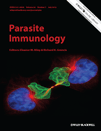
PARASITE IMMUNOLOGY
Advancing the Frontiers of Host-Parasite Research.PARASITE IMMUNOLOGY, published by Wiley, is a leading journal in the field of immunology and parasitology, with an ISSN of 0141-9838 and E-ISSN of 1365-3024. Since its inception in 1979, it has played a pivotal role in advancing our understanding of host-parasite interactions, immunological responses to parasitic infections, and the mechanisms of immunological resistance. The journal is adeptly positioned within the academic community, currently holding a prestigious Q2 ranking in Parasitology and a Q3 ranking in Immunology for 2023, indicating its significant influence and relevance. Its comprehensive scope attracts a diverse readership, contributing to the discourse surrounding novel therapeutic approaches and emerging challenges in parasitic diseases. With a consistent convergence of research until 2024, PARASITE IMMUNOLOGY is an essential resource for researchers, professionals, and students seeking to deepen their knowledge and foster collaboration in these dynamic fields. Although it is not an open-access journal, the insights shared within its pages are invaluable for shaping future research trajectories.
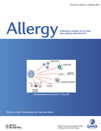
ALLERGY
Illuminating Innovations in Allergy and Immunology.ALLERGY is a leading international journal published by WILEY, dedicated to advancing the understanding of allergic diseases and immunology. With an ISSN of 0105-4538 and an E-ISSN of 1398-9995, this esteemed journal has been at the forefront of the field since its inception in 1948 and continues to publish high-quality research up until 2024. Positioned in the Q1 category for both Immunology and Allergy, ALLERGY ranks impressively within the top percentiles of its categories, underscoring its significant impact, as reflected in its Scopus rankings (#11 out of 233 in Immunology and Allergy, and #14 out of 236 in Immunology and Microbiology). Researchers and practitioners accessing this journal can expect a rigorous selection of peer-reviewed articles that address current challenges, innovative therapies, and advancements in the immunological sciences. Although it is not an open-access journal, ALLERGY remains vital for academics, healthcare professionals, and students alike, fostering a deeper understanding of the mechanisms and treatments associated with allergies.
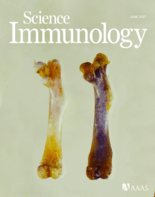
Science Immunology
Unraveling Complexities, Empowering DiscoveriesScience Immunology, published by the American Association for the Advancement of Science, is a leading journal in the field of immunology, recognized for its significant impact and rigor in advancing our understanding of immune responses and complex diseases. With an impressive impact factor that places it in the Q1 category of both immunology and allergy, as well as miscellaneous medicine, this journal is ranked #7 and #8 in their respective Scopus categories, reflecting its high-quality research output. Since its inception in 2016, Science Immunology has been at the forefront of interdisciplinary immunological research, fostering crucial insights that link immunology with pressing health challenges. The journal is committed to providing open access to its content, ensuring that groundbreaking findings are accessible to a global audience of researchers, professionals, and students. Its anthology not only addresses fundamental immunological mechanisms but also enhances the dialogue on translational applications and therapeutic interventions, solidifying its position as an essential resource within the scientific community.
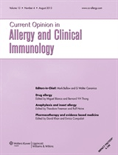
Current Opinion in Allergy and Clinical Immunology
Unveiling expert insights in allergy and clinical practice.Current Opinion in Allergy and Clinical Immunology, published by Lippincott Williams & Wilkins, is a pivotal journal that serves as a key resource for professionals in the fields of immunology and allergy. With an ISSN of 1528-4050 and an E-ISSN of 1473-6322, this journal presents cutting-edge reviews of the latest research findings, methodologies, and therapeutic approaches in the management of allergic and immunological disorders. With a Q3 category ranking in both Immunology and Allergy for 2023, and a Scopus rank of #103 in Immunology and Allergy, it reflects a solid position within the scientific community. Operating in the highly dynamic fields of immunology and clinical practice since its inception in 2001, the journal aims to harmonize emerging research trends with clinical applications to enhance patient outcomes. Although it does not currently offer Open Access options, the journal's substantial impact factor attests to its significance as a scholarly resource. By disseminating high-quality reviews and expert opinions, Current Opinion in Allergy and Clinical Immunology continues to foster knowledge advancement and professional development among researchers, practitioners, and students alike.
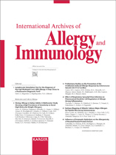
INTERNATIONAL ARCHIVES OF ALLERGY AND IMMUNOLOGY
Fostering Knowledge in the Evolving Landscape of Immunology.INTERNATIONAL ARCHIVES OF ALLERGY AND IMMUNOLOGY, published by KARGER, is a distinguished journal dedicated to advancing the field of immunology and allergy research. With an ISSN of 1018-2438 and an E-ISSN of 1423-0097, this journal has been a vital resource since its inception in 1950, continuing to publish influential articles through 2024. Hailing from Switzerland, it holds an important position within the Q3 category in Immunology and Allergy and Q2 in miscellaneous Medicine, reflecting its growing impact in the scientific community. The Scopus rankings showcase its relevance, with a 52nd percentile in Immunology and Allergy and 45th in Immunology and Microbiology. Although not an open-access journal, it plays a critical role in disseminating significant findings and innovations in the understanding of allergic diseases and immunological responses. The INTERNATIONAL ARCHIVES OF ALLERGY AND IMMUNOLOGY is essential for researchers, clinicians, and students eager to stay at the forefront of allergy and immunology developments.

Immunological Medicine
Bridging Academia and Clinical Practice in ImmunologyImmunological Medicine, published by Taylor & Francis Ltd, is an esteemed open-access journal that has made significant strides in the field of immunology since its establishment in 2018. With an E-ISSN of 2578-5826, the journal has quickly gained recognition for its contribution to advancing immunological research, evidenced by its impressive ranking in the Q2 quartile for both immunology and allergy. Positioned in the United Kingdom, it offers a platform for publishing high-quality original research, reviews, and case studies that delve into the complex interactions of the immune system and its implications for human health. The journal serves as a vital resource for researchers, professionals, and students engaged in the burgeoning fields of immunology, providing open access to a wide audience and fostering collaboration and innovation. With a current Scopus ranking of #81 out of 233 in Immunology and Allergy and #97 out of 236 in Immunology and Microbiology, the journal aims to enhance the visibility and impact of cutting-edge research by bridging the gap between academia and clinical practice.
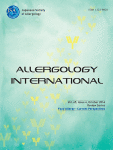
ALLERGOLOGY INTERNATIONAL
Advancing global knowledge in allergy and immunology.ALLERGOLOGY INTERNATIONAL is a prestigious, peer-reviewed journal dedicated to advancing the field of immunology and allergy research. Published by the Japanese Society of Allergology, this Open Access journal has been democratizing knowledge since 1996, providing a platform for the latest findings and clinical practices in the management of allergic diseases. Its impressive Q1 ranking in both Immunology and Allergy** and **Medicine (miscellaneous)** categories in 2023 highlights its significance in the global scientific community, with a commendable Scopus ranking of #31 out of 233 in the field of immunology. The journal's focus on innovative research, comprehensive reviews, and case studies ensures that it remains a vital resource for researchers, healthcare professionals, and students alike. Situated in Tokyo, Japan, it continues to bridge gaps in allergy-related health information and foster international collaboration among scholars.
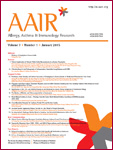
Allergy Asthma & Immunology Research
Advancing knowledge in Allergy, Asthma, and Immunology.Allergy Asthma & Immunology Research, published by the Korean Academy of Asthma Allergy & Clinical Immunology, is a leading journal dedicated to advancing the fields of immunology, allergy, and respiratory medicine. With an ISSN of 2092-7355 and an E-ISSN of 2092-7363, this esteemed publication has been a cornerstone for researchers and practitioners since its inception in 2009 and continues to disseminate critical findings through till 2024. The journal is ranked in the Q3 category in Immunology and the Q2 category in Immunology and Allergy as well as Pulmonary and Respiratory Medicine, illustrating its impact in these vital fields. With a solid Scopus ranking in multiple sub-disciplines, the journal not only contributes to the scientific discourse but also promotes innovative research and clinical practices. Although currently operating without an open access model, the journal remains highly regarded for its thorough peer-review process and commitment to academic excellence, making it an essential resource for professionals, researchers, and students passionate about advancing knowledge in allergy, asthma, and immunology.

Allergy Asthma and Clinical Immunology
Advancing knowledge in allergy and asthma research.Allergy Asthma and Clinical Immunology, a pioneering open access journal published by BMC, has been at the forefront of immunological research since its inception in 2005. With an ISSN of 1710-1492, this UK-based journal has established a significant presence in the fields of Immunology, Allergy, and Pulmonary and Respiratory Medicine, achieving notable quartile rankings such as Q2 in Immunology and Allergy in 2023. It plays a crucial role in disseminating high-quality research that advances our understanding of allergy and asthma, making substantial contributions to clinical practices and public health. The journal embraces the principles of Open Access, allowing researchers, professionals, and students from around the globe to access its content freely, thus facilitating knowledge sharing and collaboration within the scientific community. As it converges towards 2024, Allergy Asthma and Clinical Immunology continues to attract impactful studies that drive innovation and improve patient care in the face of rapidly evolving challenges in immunological health.
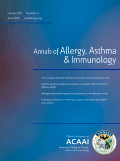
ANNALS OF ALLERGY ASTHMA & IMMUNOLOGY
Unveiling Insights into Allergic and Respiratory HealthANNALS OF ALLERGY ASTHMA & IMMUNOLOGY is a premier peer-reviewed journal published by Elsevier Science Inc, dedicated to advancing the fields of allergy, asthma, and immunology. With its roots dating back to 1995 and with a focus on high-impact research, this journal has established itself as a leading platform for the dissemination of original research, reviews, and clinical studies within these critical areas. The journal boasts an impressive impact factor, supporting its Q2 ranking in both Immunology and Allergy, as well as in Pulmonary and Respiratory Medicine, indicating its significant contribution to the scientific community. Although it does not currently offer open access options, its comprehensive coverage and rigorous peer-review process ensure that published articles are of the highest quality, making it an invaluable resource for researchers, clinicians, and students alike. The Scopus rankings reflect its esteemed position in the academic landscape, providing professionals with access to cutting-edge developments and insights into the management and treatment of allergic and respiratory conditions.